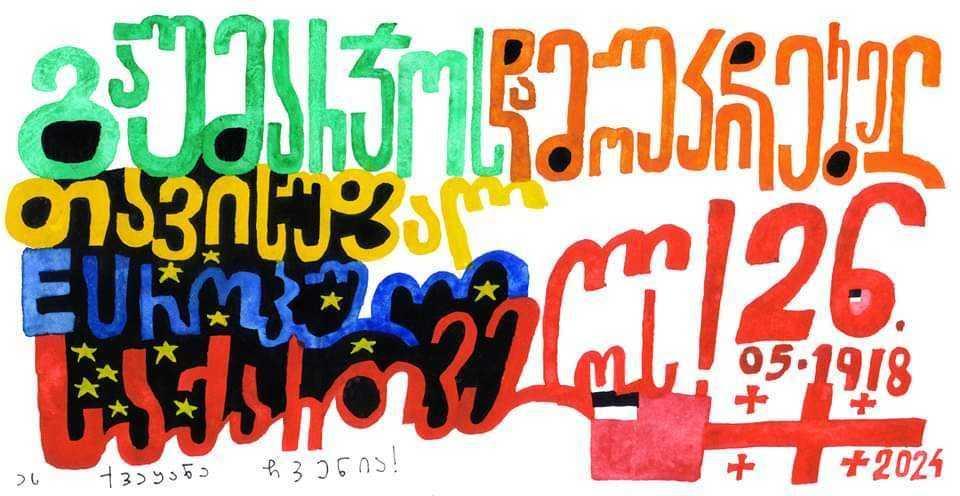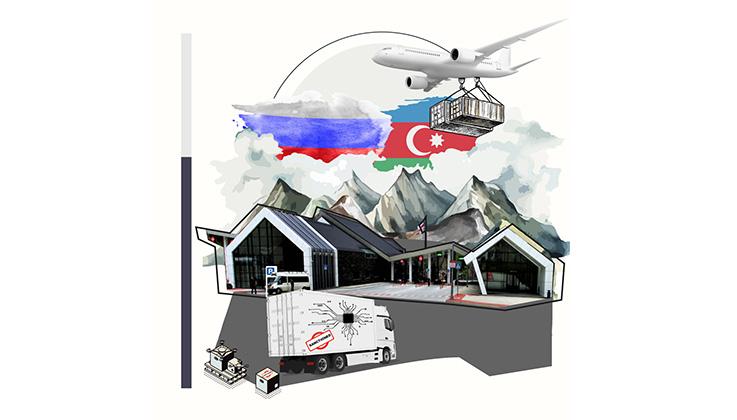
Authors : Aidan Iusif, Natia Mikhelidze


Our experiments and foreign trade statistics will convince you that drones, computer processors, GPS or memory cards are sent to Russia via Georgia. These dual-use items can serve both everyday needs and military purposes, including weapons assembly. Although the export of such goods to Russia has been banned since December 2022, not all countries have complied with the restrictions.
During the experiments, one carrier told us that there was no problem: “I’ll take the drones from Georgia to Russia via Azerbaijan, we’ve done it before.” The second carrier offered to send “computer chips” from Tbilisi to Samara in an easier way - directly, through Vladikavkaz.
Our seven-month journalistic investigation uncovered a scheme supplying Russia with sanctioned goods involving Georgia, Armenia, Azerbaijan, Kazakhstan, Kyrgyzstan, and Uzbekistan.
iFact Experiment #1
How are drones sent from Georgia to Russia? — “Through Azerbaijan”
To find out whether stories about the delivery of sanctioned cargo to Russia were true, we used the following method: On 21 May 2024, we contacted the transport company Kairo-Logistics via WhatsApp, introduced ourselves as regular customers and requested the shipment of 30 drones from Tbilisi to the Russian city of Samara. We specified that we needed them for a video editing studio.
We were contacted by an operator in Krasnodar called Evgeny. After asking us about the model, power, and quantity of the drones, he informed us about the route: “We will take the cargo via Azerbaijan…Azerbaijan or Iran, we are currently working out these options, but most likely it will go via Azerbaijan.”

Instagram profile of Kairo-Logistics in March-April 2024
The next day, while checking the conditions, the operator reassured us: “We give you a 100% guarantee. We’ll deliver your cargo to its destination—we’ve handled sanctioned items before and know what it entails.”
It was now time to settle on a price. The operator at Kairo-Logistics asked for 500,000 Russian Rubles (15,000 GEL) to deliver 30 drones from Tbilisi to Samara. However, the website’s price calculator showed an approximate cost of 25,000 Russian Rubles (793 GEL) for transporting this weight of cargo. It appeared that Evgeny was charging us 20 times the standard rate.
When we asked the operator to explain the inflated price, he replied: “It’s sanctioned cargo. You understand yourselves; you need to communicate with positions using envelopes” (presumably alluding to paying bribes at the border).
Everything proved simple - the transport company promised us that they would pick up and deliver the cargo; all they needed from us was an invoice and an electronic signature on the contract. At this stage, we stopped the experiment, as we had collected the necessary information from the company.
Before publishing the article, we called Kairo-Logistics once again, and revealed that we were journalists and wanted to record an interview. At first, Evgeny had introduced himself as the company’s manager, but now, within two seconds, he told us that he was just an intern and redirected us to a manager named Alex Bagatov.
Bagatov confirmed that, despite the sanctions, they continued to transport banned goods to Russia. The only difference now, he explained, was the route—previously, shipments went directly to Russia, but now they passed through Turkey or Azerbaijan. When we asked the head of Kairo-Logistics how he managed such a risky business amid international sanctions, he explained that they modified the origin documents for the cargo.
“Look, for the country supplying the goods, there is no problem because the goods are not sent to Russia, but to Turkey or Azerbaijan,” he said before adding: “They later reach Russia. Therefore, everything is legal for the country from which the cargo is sent.”

Kairo-Logistics office in Hualing Plaza, Tbilisi. A screenshot from the website of “Kairo-Logistics” confirms that they had an office in Tbilisi
What do we know about Kairo-Logistics?
Its legal name is Servis-Multi LLC and it also operates in Turkey, Europe, and the United Arab Emirates. Servis-Multi was registered in Moscow in 2018, its director is Dmitry Mordvinov, and its owner is Maxim Shepilov. The latter brings cars to the CIS and Russia with the help of another transport company. Before the COVID-19 pandemic, Kairo-Logistics had a warehouse in a building at Hualing Plaza in Tbilisi. Now the company does not have an office or a warehouse at a specific address. It publishes its service terms on its website and Facebook pages, and takes orders online. We also contacted the operator via WhatsApp. The company openly states on its website and Facebook page that it is involved in the transportation of sanctioned cargo.
Note: “Kairo Logistics” LLC, registered in Georgia in 2013, with the website Kairos.ge, is another company and has nothing to do with the mentioned experiment.
High-quality professional videos are shot with drones like the ones we were supposed to send to Samara as part of the experiment. This drone is equipped with the same engine as FPV drones (‘kamikaze drones’), which have been used in the Russo-Ukrainian war since 2022.
Military and defense experts explained that in modern warfare, even a seemingly harmless drone can become a powerful military asset.

The drone equipment we were sending as an experiment
Model — SJRC f11s 4K pro drone, 4K professional with HD
A military journalist explained anonymously: “Disassembling civilian drones and repurposing their motors for FPV drones is straightforward. Reassembly takes time, but it is not particularly challenging. One person, equipped with basic tools and a working knowledge of electronics, can assemble dozens of drones in a day. The essential components are an axis, a camera, a processor (the ‘brain’), and an antenna.” “Some people use drones to photograph weddings, others use them for military purposes. Of course, I can tell you with certainty that the drones delivered to Russia will be used for military purposes, there is no doubt about it,” Reserve Colonel Lasha Beridze assured us.
Beridze was the Deputy Chief of the General Staff of the Armed Forces from 2011-2013 and led Georgia’s first peacekeeping contingent in Afghanistan in 2010.
Meanwhile, a cybersecurity expert told us anonymously: “The civilian purpose of FPV (“kamikaze-drone”) is for sports flights, photo-video shooting, landscape, or geography studies. However, it can also be used for reconnaissance in war and surveillance of enemy targets. The drone can be used both as a surveillance tool and as a weapon of attack. It can be easily equipped like a guided missile.”
In response to the war in Ukraine and the imposition of sanctions against Russia, the Revenue Service of Georgia claims to have tightened customs controls. According to reports, between 24 February 2022 and 27 June 2024, customs authorities intercepted and turned back 1,969 shipments of sanctioned goods.

Russian shell attached to a drone, with the inscription
“for Kharkiv” Photo: ua.korrespondent.net
On July 2, the Customs Department wrote to us: “...all goods included in the list defined by the sanctioning countries, as well as any customs operations (including export and re-export), which may be carried out with the involvement of sanctioned persons or companies, are subject to special customs control in order to prevent the use of the customs territory of Georgia as a corridor for the transportation of sanctioned goods.”
Nevertheless, official statistics and the facts we have uncovered indicate that sanctioned goods have been allowed to pass through Georgia’s borders. From Georgia, dual-use goods first go to Armenia, Azerbaijan, and Central Asia, before reaching the final destination of Russia.
Under the Shadow of Sanctions
How Does Russia Replenish its Arsenal?
In 2014, in response to the annexation of Crimea, the Council of the European Union banned the export of dual-use items to Russia and issued a corresponding regulatory document. On 25 February 2022, in the wake of Russia’s full-scale invasion of Ukraine, new prohibitions were added to this regulation.
The European Union, the USA, Japan, and the United Kingdom compiled a list of items deemed high priorities for the battlefield, making it illegal to send them to Russia. This list has been updated several times and currently includes 50 named products.
According to the definition of the Revenue Service of Georgia, dual-use items are products that can be used for both civilian and military purposes, as well as for the production of biological and/or chemical/nuclear weapons or explosives containing nuclear material.
Simply put, dual-use items can be found in everyday kitchen or bathroom appliances as well as in military weapons. One example is the so-called “brain” of a washing machine—a small component that uses an electronic algorithm to execute commands. With the press of a button, we instruct the brain to wash or spin clothes, and it complies. That same brain could also be assigned to a combat mission and release a shell with similar simplicity.
The purpose of the Western sanctions imposed in 2022 was to limit access to these products for Russia and prevent the production of combat weapons. However, obedience thereto was not universal, and shipments of sanctioned products to Russia continued.
In June 2023, the U.S. State Department identified the following five countries aiding Russia to evade sanctions: Georgia, Turkey, Kazakhstan, Armenia, and the United Arab Emirates.

The “brain” of a washing machine (photo taken at a household appliances fair in Gldani, Tbilisi in September 2023).
“There has been an increase in the import of critical electronics to Russia. For example, chips found in your dishwashers. Some of them were found on the battlefield in Ukraine, in the debris of Russian equipment…The transit of such items from Georgia has also increased, and we hope it will decrease in the future,” said Jim O’Brien on 7 June 2023 at a European Council on Foreign Relations (ECFR) meeting. O’Brien is now the Assistant Secretary of State for European and Eurasian Affairs at the U.S. State Department. Previously, in 2022, he led the Office of Sanctions Coordination.
Meanwhile, the Revenue Service of Georgia assures us of tightened border control measures.
“Immediately after the start of the aggressive war in Ukraine, despite the significant increase in the movement of various goods/cargoes through the territory of Georgia, the Revenue Service has made a significant contribution to supporting the enforcement of international sanctions. From the very first days of the imposition of sanctions, it has consistently ensured strict control over the enforcement process. The visit of the US Ambassador once again confirms that the Revenue Service fully and firmly adheres to international sanctions enforcement procedures,” read a statement from the Revenue Service published on 13 April 2024, following a meeting between US Ambassador Robin Dunnigan and Revenue Service head Levan Kakava.
Later, on July 26, the Revenue Service wrote the following to us: “Georgia fully and resolutely complies with the procedures of international sanctions and there is no evidence to the contrary. “Since the first days of the introduction of international sanctions, a relevant working group was established in the Revenue Service of the Ministry of Finance of Georgia, which exercises centralized control over compliance with the said sanctions.”
Not taking this as read, we have explored whether there may actually be “evidence to the contrary.”
What Do Export Statistics for Dual-use Items Tell Us?
After the outbreak of the war in Ukraine, Georgia has sometimes been labeled as Russia’s “lifeline” and accused of being a participant in a trading scheme for sanctioned goods. Such assertions have been made repeatedly in the European and American media.
In June 2023, a journalist asked U.S. State Department spokesman O’Brien which countries he was referring to when he spoke of sanctions evasion. “It’s a real problem, and that’s why I often travel to Kazakhstan, Georgia, and Armenia...” O’Brien replied.
Elsewhere, on 27 November 2023, the Financial Times wrote: “In the first nine months of 2023, Turkey sent products worth $158 million to Russia and five post-Soviet countries suspected of acting as intermediaries for Russia.”
We have explored the basis of these accusations in official statistics and foreign trade data.
Ultimately, we discovered that sanctioned cargo enters Russia from Georgia, sometimes via direct or short routes and sometimes through longer, indirect routes, crossing two or three national borders.
We studied the export, import, and re-export of all 50 sanctioned products. Relatedly, when we showed the list to programmer and physicist Ucha Abashidze, he told us:
“From the products listed under these codes, the following military equipment can be made: FPV drones, ‘Lancets’ (kamikaze-drones), aircraft electronics, and electronics for any modern armored vehicle; targeting, calculation, and navigation tools; and radio receivers and transmitters, stationary observation systems, and remotely controlled mines.”
We interviewed Abashidze in September 2023. He was later arrested on 9 May 2024 and is still in pre-trial detention. We have since contacted him through his lawyer, Shota Tutberidze, and he agreed to the publication of the above statement.
According to official statistics, dual-use goods worth $10.7 million were exported from Georgia to Russia, Armenia, Azerbaijan, and Central Asia in 2023-2024.
From the long list of sanctioned goods, we have highlighted the following five products whose export to Azerbaijan, Armenia, and Central Asian countries has increased significantly since 2023:
• Radio navigation equipment (satellite/GPS devices)
• Integrated circuits - processors and controllers
• Television, digital, and recording video cameras
• Digital data processing blocks (internet modems and routers)
• Devices for receiving, transmitting and converting sound, image or other data (tape recorders, microphones, and mixing consoles)
Export statistics analyzed by iFact: https://docs.google.com/spreadsheets/d/1SendTx5JUCLnrEBjHVAlMqRPLptRUiCn52eEHX0XBy8/edit?gid=1881081819#gid=1881081819
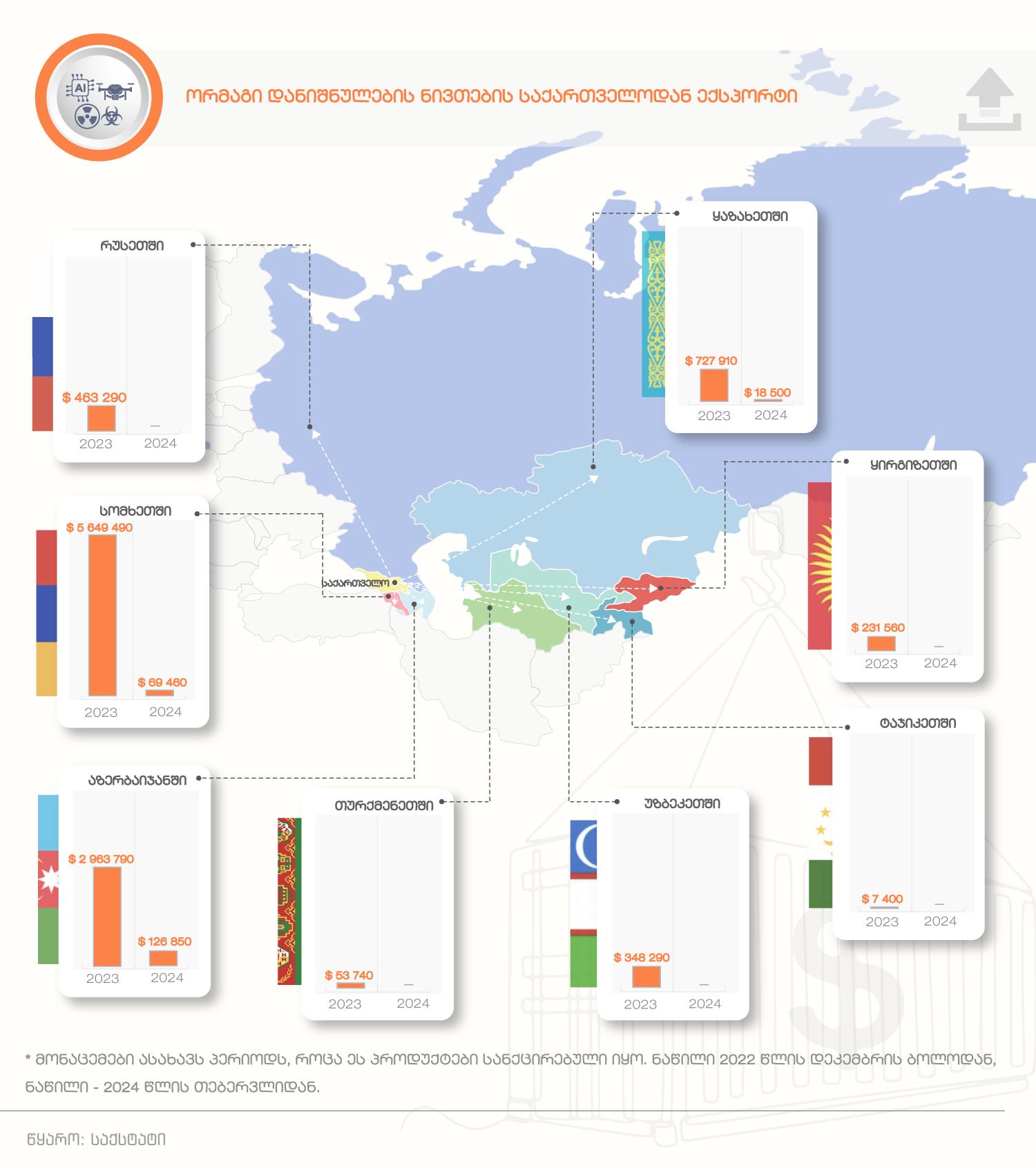
Export of dual-purpose items from Georgia
Source: Geostat
Radio Navigation Equipment
This category includes GPS receivers or mobile-phone-like devices that work without the internet and display a map with coordinates and the taken or planned route. Hikers, for example, use these devices to find their way in the mountains.
“Of course, this equipment can also be used for military purposes. Military GPS has strong protection, making it hard to jam or disable, but if you don’t have that, you can even use a civilian GPS,” Beridze told us.
Documentary footage from the Russo-Ukrainian war shows Russian aircraft equipped with ordinary civilian navigation systems. British and Ukrainian publications, citing defense departments, have reported that in the summer of 2022, American brand Garmin’s civilian GPS devices were found on downed Su-34 aircraft in Ukraine. The same finding was also revealed during the interrogation of captured Russian pilot Andrey Fedurchukov.

Garmin GPS mounted on a Russian aircraft
Source: globaldefensecorp.com
“Applications such as a ballistic calculator (which measures the direction, distance, and velocity of a bullet) can be downloaded to a Garmin navigation device,” explained a military journalist anonymously.
In 2023, Georgia experienced a notable 41% increase in the import of radio navigation equipment compared to 2021. Exports saw an even more dramatic rise of 213%, underscoring the growing role of Georgia in the regional trade of dual-use technologies. In 2023, sanctioned products under this category with a total value of $304,520 were exported from Georgia to Azerbaijan.
From 2017 to 2024, the export of radio navigation equipment has been on an unprecedentedly large scale. While Georgia traded this product in the past, it did so in much smaller quantities. The relevant statistics reflecting this trend are available here:
https://docs.google.com/spreadsheets/d/1hsP2h4OWuyxoy-AVg9i6CxBwXZsKs09Y/edit?gid=2081102031#gid=2081102031
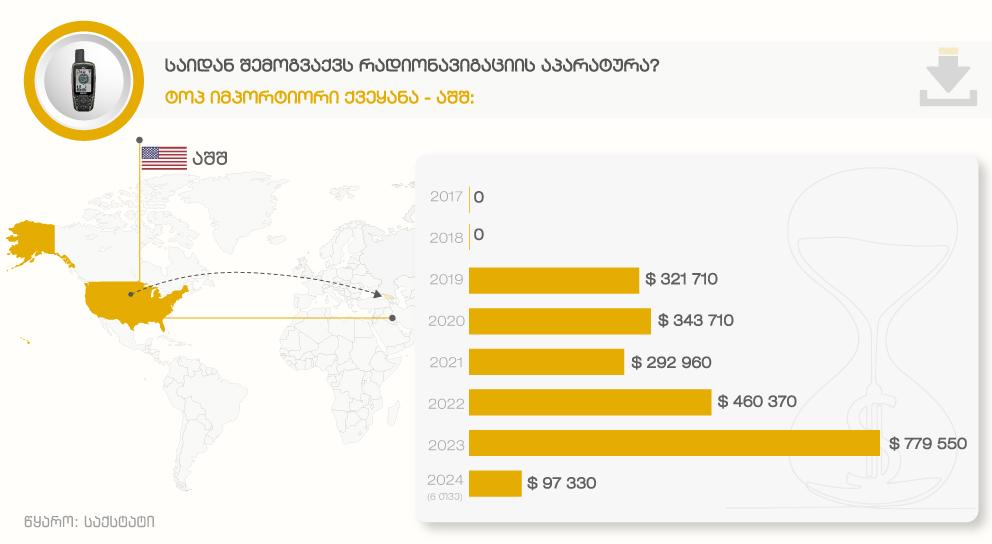
Imports of radio navigation equipment from the USA to Georgia
Source: Geostat
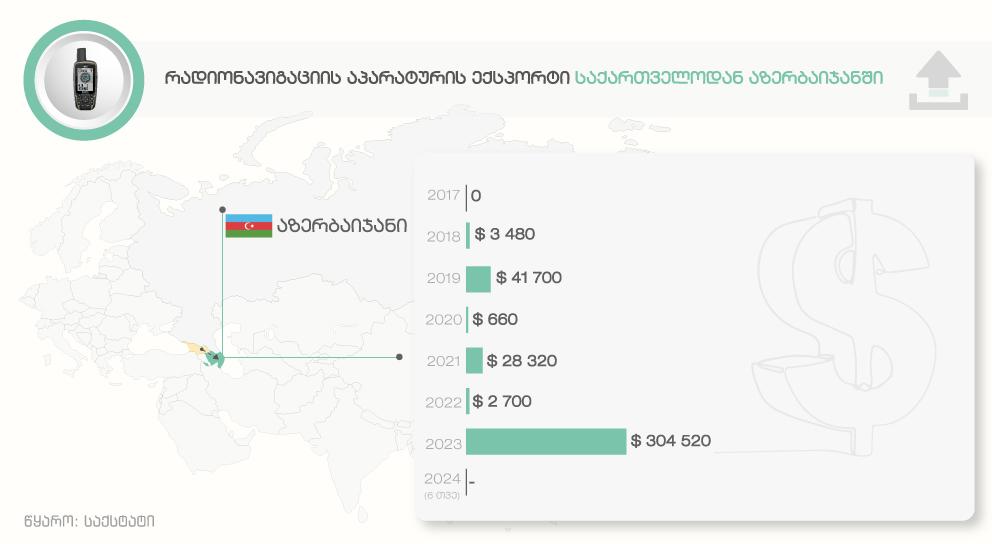
Exports of radio navigation equipment from Georgia to Azerbaijan
Source: Geostat
Electronic Integrated Circuits - Processors and Controllers
The international trade code for these products is 854231, covering several small electronic components, the purpose of which we asked specialists to explain. They clarified that an integrated circuit includes a computer processor that can control robotic military equipment, aim weapons, conduct surveillance, and collect information.
“This code includes microcontrollers used directly to control military equipment, allowing you to program direction and assign specific functions. These components are so small that, roughly speaking, you could fit several hundred thousand dollars’ worth in a shoebox,” explained Giorgi Kurulashvili, Director of Research and Development at the British IT manufacturing company Cott Electronics.
Georgia imports integrated circuits worth approximately $2-3 million annually. While the import figures have not increased since the start of Russia’s war in Ukraine, the same cannot be said for exports.
In 2023, Georgia exported integrated circuits worth $261,580 to other countries, the highest such figure in its history and a 36% increase compared to 2021.
In 2023, integrated circuits were exported from Georgia to the following nine countries: Armenia, Azerbaijan, Kazakhstan, Kyrgyzstan, Uzbekistan, Malta, the Netherlands, Turkey, and Ukraine. The cases of Uzbekistan, Armenia, and Kyrgyzstan are particularly noteworthy here.
Uzbekistan is a completely new market for Georgia, having never had any history of trading integrated circuits with the country. In 2023, it exported integrated circuits worth $36,720 to Uzbekistan.
Elsewhere, although Georgia has previously exported integrated circuits to Armenia, it did so in relatively small quantities compared to 2023.
As for Kyrgyzstan, such exports hit a seven-year peak in 2023.
The UN (comtradeplus.un.org) has confirmed that Kyrgyzstan and Armenia send integrated circuits to Russia. In 2023 alone, Kyrgyzstan exported over $3 million worth of integrated circuits to Russia, while Armenia exported $869,718 worth, which is 683 times more than in 2021.
Note: It is important to bear in mind that although the UN’s database does not show that Uzbekistan and Azerbaijan sent sanctioned products to Russia in 2023, such data are collected from the countries themselves. Therefore, it is possible that some countries do not provide them with sufficient or accurate data. Therefore, we cannot be sure that dual-use goods sent from Georgia to Uzbekistan and Azerbaijan did not ultimately reach Russia.
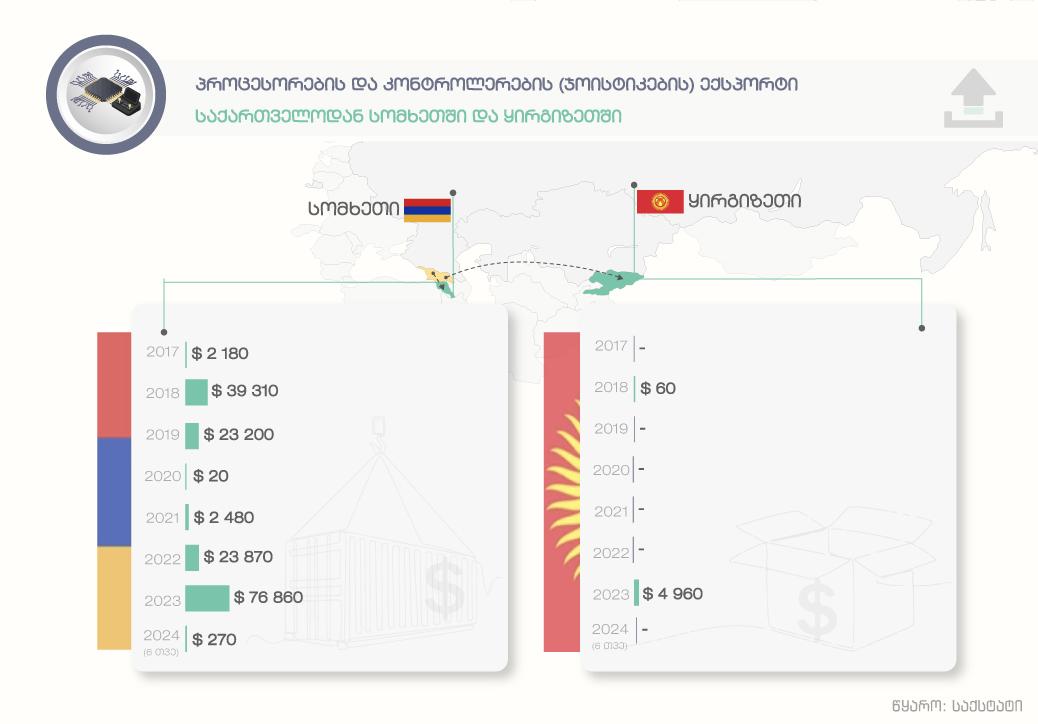
Exports of processors and joysticks to Armenia and Kyrgyzstan
Source: Geostat
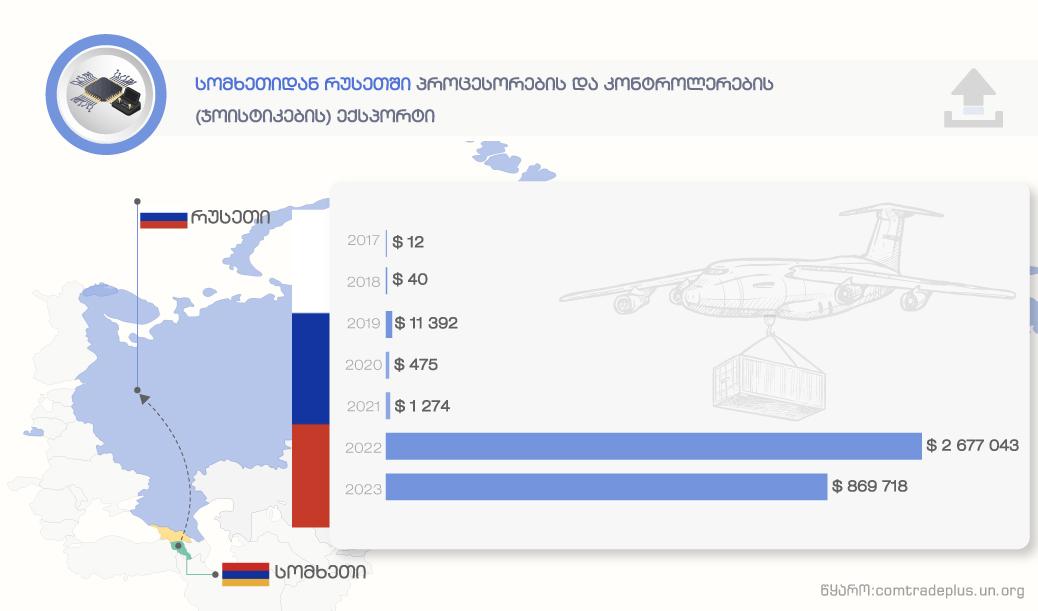
Exports of processors and controllers (joysticks) from Armenia to Russia
Source: comtradeplus.un.org
Data Processing Digital Units
A typical example of this sort of device is an internet modem, which has a single casing with several compartments inside and plugs for cable input and output.
Physicist and programmer Abashidze explained that such units are essential elements of modern digital electronics. For example, they are found in laptops and PlayStation joysticks. At the same time, they can also be found in drones or tanks.
“To illustrate such versatility, such a unit is used in flight controllers and kamikaze-drones (author’s note: Russia has been using Shahed-136/131 kamikaze-drones in its war with Ukraine), and there is also such a unit in the Arduino microcontroller applied for educational purposes. They can otherwise be used to make door locks, drones, or light switches. In general, all modern weapons rely on Arduino, which can be taken out of any electronic device,” Abashidze told us.
In 2023, Georgia exported this sanctioned product to 15 countries in Europe, Asia, and Africa. Two of these are of particular interest: Kyrgyzstan and Armenia.
In that same year, Georgia exported digital data processing blocks worth $3 million to Armenia. To put that into context, the total of such exports from 2017 to 2022 was just $644,210.
Meanwhile, Georgia exported $225,760 worth of such products to Kyrgyzstan in 2023. Prior to that, there was virtually no history of Georgia trading these products with Kyrgyzstan.
The UN’s foreign trade data confirm that Kyrgyzstan and Armenia supply these dual-use products to Russia.
A cybersecurity specialist explained anonymously: “Digital data processing devices—such as modems—can be used for communication purposes. They may also support the creation of communications infrastructure and networks, which could be advantageous in combat situations. Additionally, audio or image reception devices can be used for communication, intelligence, and surveillance.”
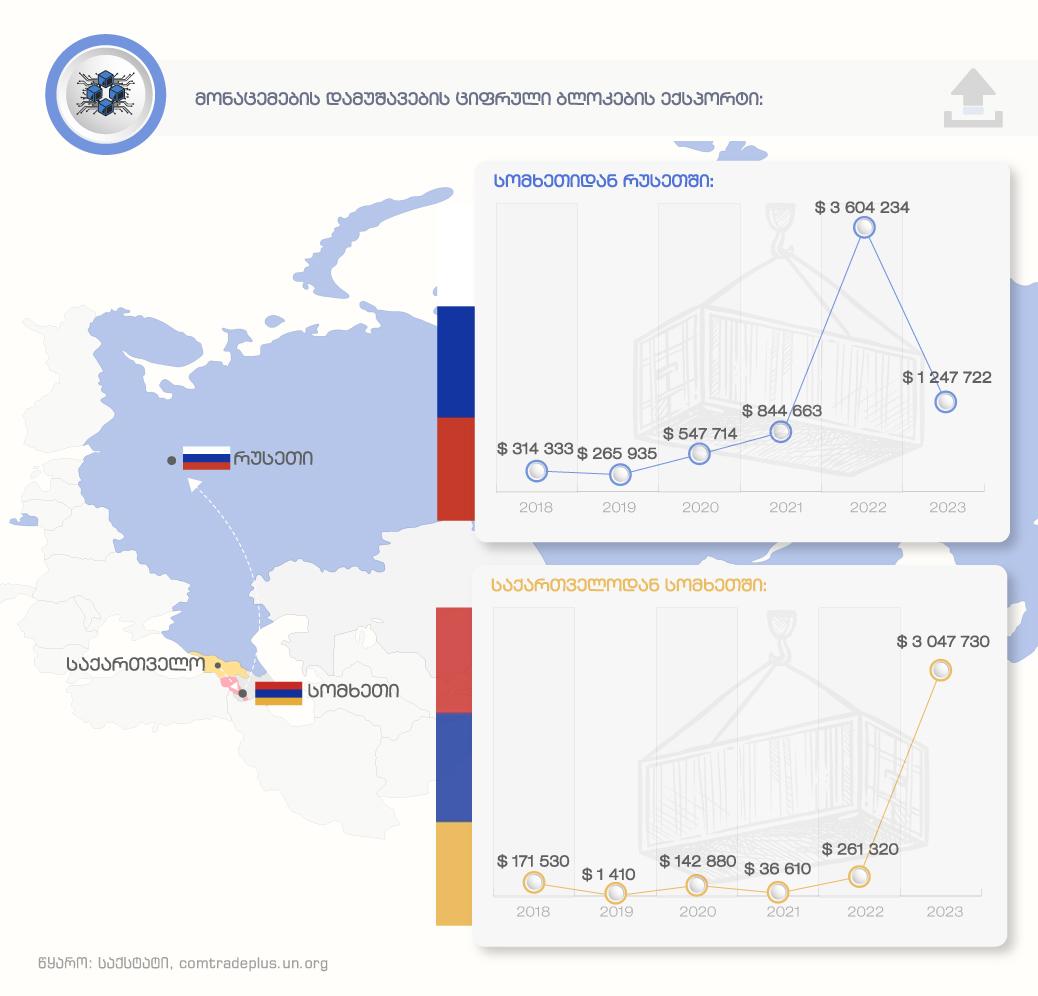
Exports of digital data processing units
Sources: Geostat, comtradeplus.un.org
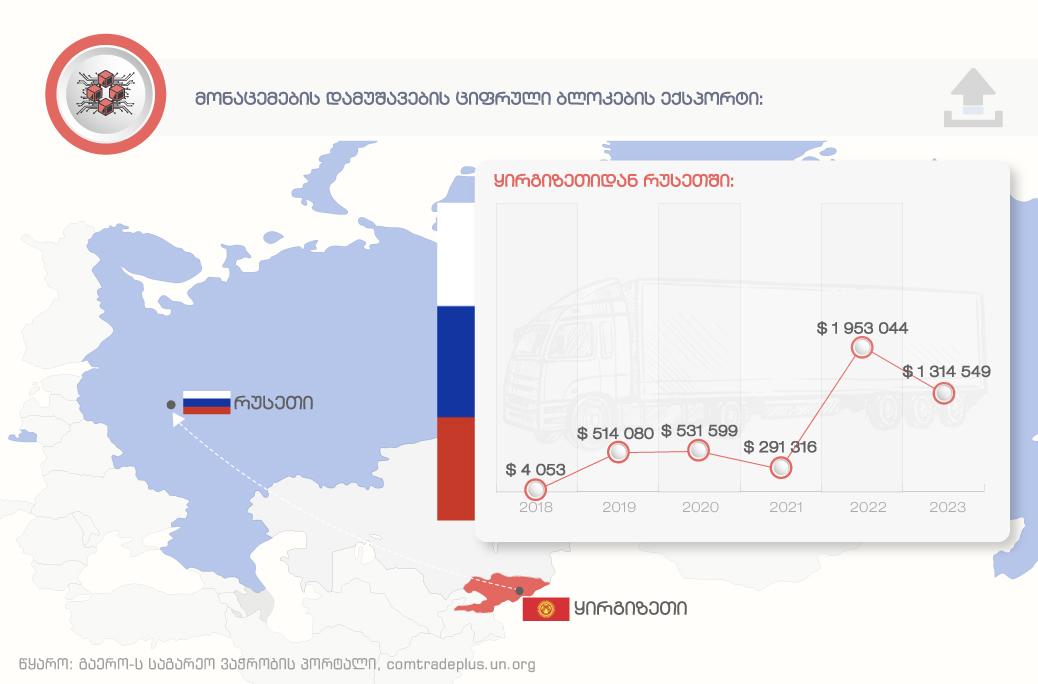
Exports of digital data processing units
Source: comtradeplus.un.org
Equipment for Receiving and Transmitting Sound/Images
This equipment is also of dual-use nature and is included in the list of sanctioned products. From 2021 to 2023, exports of this equipment from Georgia increased by 34%, while imports into Georgia increased by 74%.
In the past year, sound/image receiving and transmitting equipment was exported from Georgia to 30 countries, including Armenia, Azerbaijan, and several Central Asian countries. Notably, over that period, there has been a sharp increase in exports to Kazakhstan and Azerbaijan in particular.
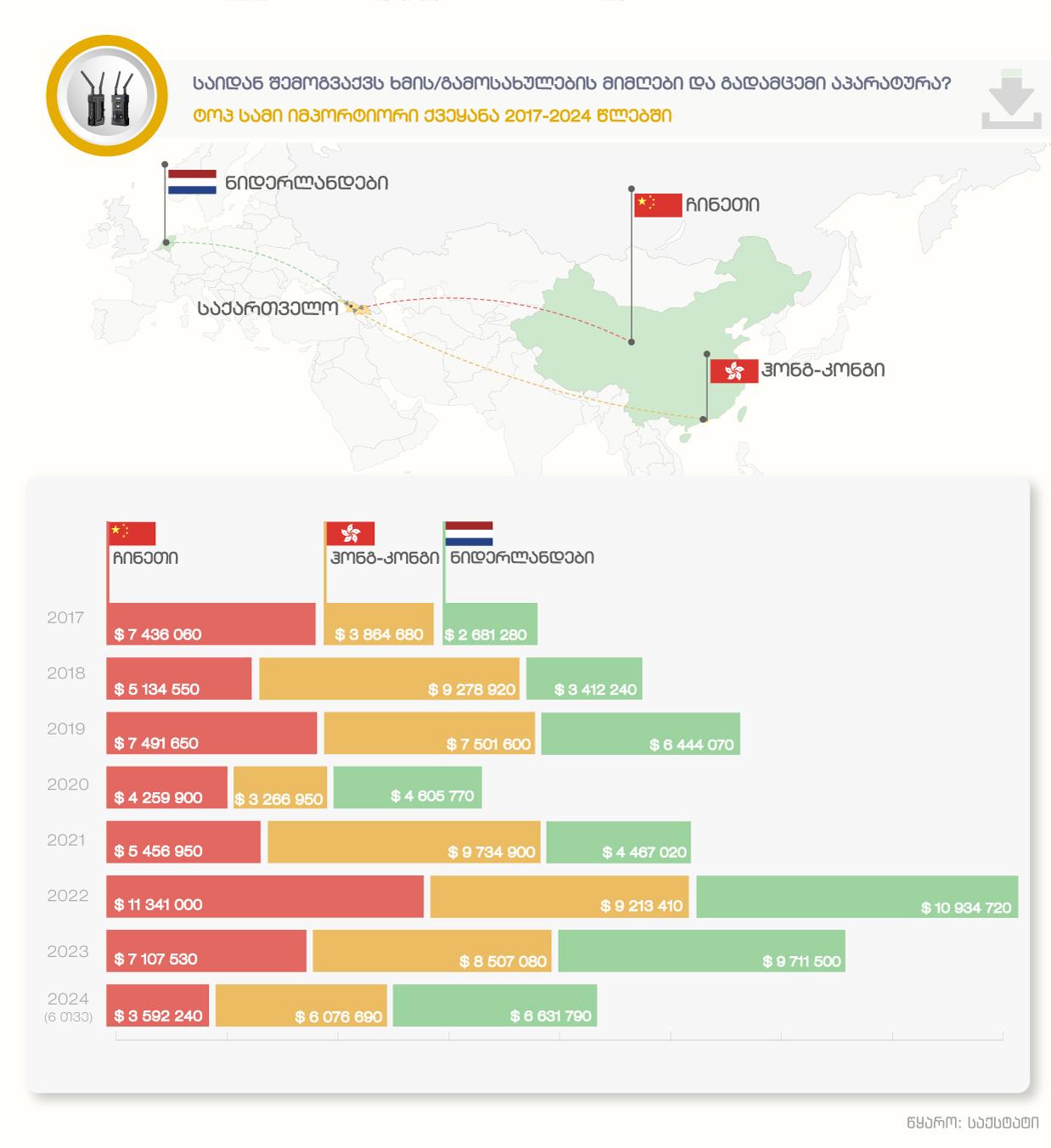
Georgia’s imports of sound/image receiving and transmitting equipment
Source: Geostat
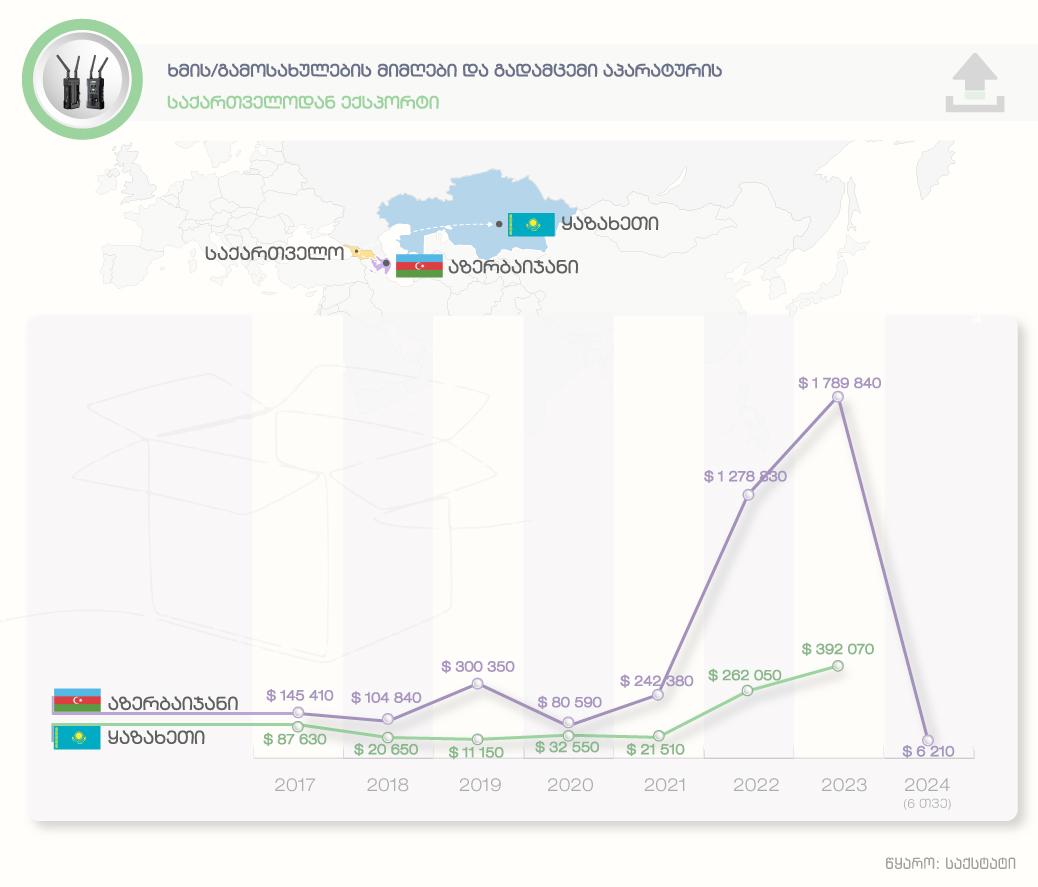
Exports of sound/image receiving and transmitting equipment from Georgia
Source: Geostat
Such unprecedented trade statistics led us to suspect that Kazakhstan and Azerbaijan have been supplying Russia with this dual-use product, which would potentially explain the increased demand. Accordingly, we checked the UN’s foreign trade statistics to verify this suspicion.
The statistics confirm that since the start of Russia’s war on Ukraine, Kazakhstan and Azerbaijan have increased their exports of sound/image receiving and transmitting equipment to Russia. We asked the National Statistics Office of Georgia (Geostat) which parties import sanctioned dual-use items to Russia or to third countries. However, Geostat declined to provide this information in full, citing confidentiality reasons.
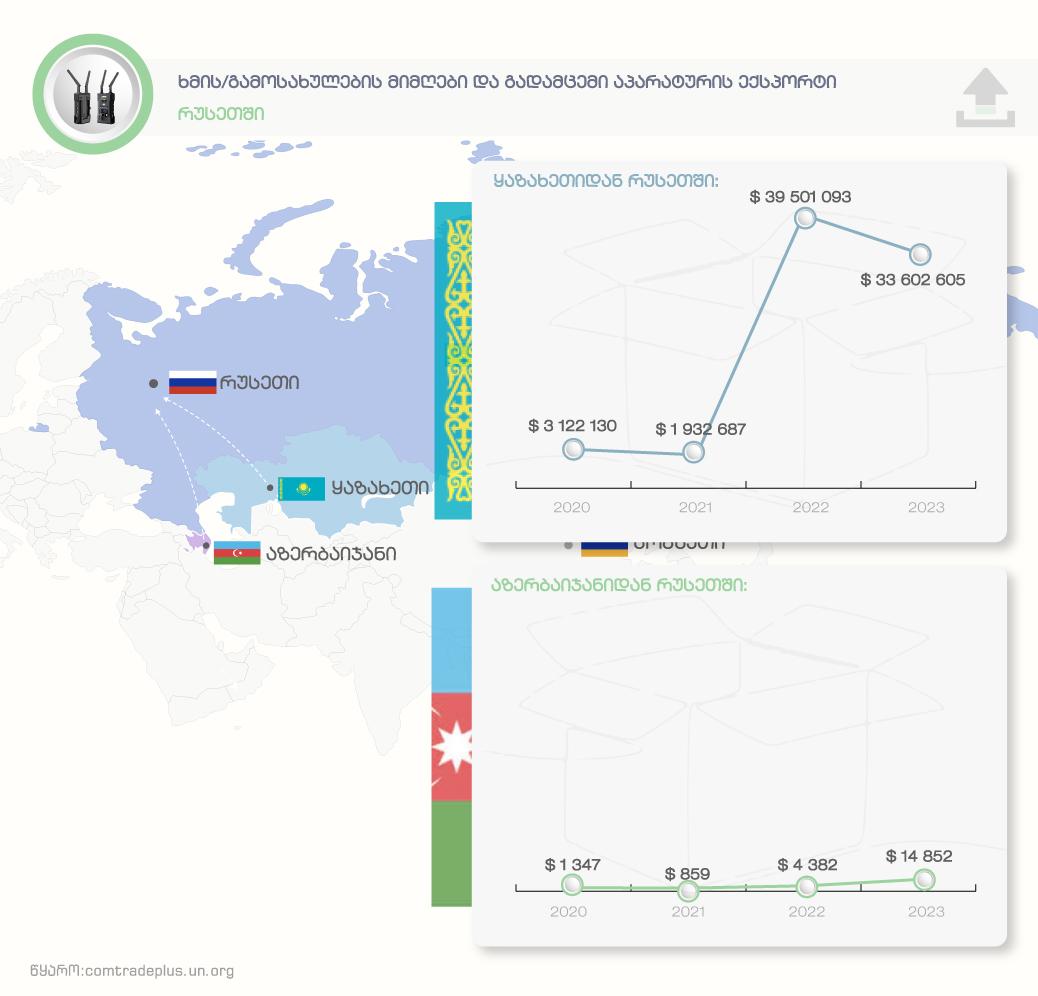
Exports of sound/image receiving and transmitting equipment to Russia
Source: comtradeplus.un.org
Nevertheless, we were able to find out that, in 2023, seven companies exported digital data processing blocks to Armenia. In the same year, 16 companies exported sound/image receiving and transmitting equipment to Azerbaijan, while three companies exported such products to Kazakhstan. It appears that the export of dual-use items to third countries has not been restricted.
iFact Experiment #2:
How Do Integrated Circuits Reach Russia?
Following our investigation into drones, we wondered whether it would be as easy to send another sanctioned item to Russia, namely integrated circuits. For this experiment, we selected two sample items—a computer processor and a hard drive.
We contacted five transport companies via WhatsApp, expressing our interest in shipping processors and internal memory cards from Tbilisi to Samara. One of the carriers refused outright, stating: “We can’t arrange such a shipment for anyone.”
In contrast, Cargo Rapido LLC readily agreed to transport the sanctioned goods. We discussed the shipment of 60 Intel processors and 30 internal HDD memory cards with the company’s operator, Natalia. She informed us that the rate to ship one kilogram of cargo to Samara was 15 GEL, but that we would also need to pay “insurance” equal to 10% of the total value ($2,300.) “By insurance, we mean this option, which means exporting the cargo without formal paperwork,” Natalia explained.
After clarifying the price, we approached the delicate issue of sanctions. Specifically, we told Natalia that we were worried about potential problems due to international bans. We also mentioned that other companies had turned us down and asked why her company would be willing to take such a risk.
In response, she reassured us, saying: “We’ll handle everything, but unofficially.”

The dual-use items we purported to be shipping as part of this experiment
She then added: “What others tell you is true—sanctions and so forth. This type of goods legally… [she didn’t finish]. Regarding export, it will go unofficially from Georgia and then to Russia, without export declarations or similar procedures. We have a company and will formalize the contract. However, the cargo description won’t be included. We’ll just state that we received such and such cargo from you, and the insurance is 10%. If I couldn’t transport it, I’d tell you directly. Since I’m explaining how we will do it, it means we will do it. The price includes all risks.”
Cargo Rapido’s transportation route is Tbilisi–Vladikavkaz–Samara, with an estimated delivery time of about four weeks.
“What documents do we need?” we asked. “None,” Natalia replied, before continuing: “I don’t need anything because it’s done unofficially. The only thing is that we’ll sign a contract with a physical person, and the payment will be made to a physical person. Just to be clear, it can’t go through the company’s account. Why would you need customs clearance in Russia? We’re doing this unofficially.”— Natalia than sent us a standard contract.
Cargo Rapido LLC was registered in Georgia in 2020. Its director and owner is a Russian citizen Taimuraz Tokazov, originally from North Ossetia. The company has an office at Zakariadze Street #5 in Tbilisi’s Saburtalo district, on the first floor of a residential building.
An employee from the neighboring office of Yandex revealed: “They’ve been here for about five or six months, maybe more. They send and receive packages. Two or three clients come daily,” adding that Tokazov only comes when customers call to send cargo.
We called with the apparent intention to send such cargo. Tokazov answered Natalia’s number, and we told him we wanted to send cargo to Russia. Tokazov scheduled a meeting at his office in three hours’ time.

Tbilisi Office of Cargo Rapido
When we arrived, we told him that we were journalists and that we had questions for him. Tokazov became confused and refused to be interviewed, citing his lack of knowledge of the Georgian language. Previously, he had been speaking clearly to us in Georgian. He then said he was in a hurry to pick up his children from kindergarten.
When we asked if he was transporting cargo to Russia, he denied it, immediately turned off the lights, started locking up the office, and quickly headed to his car. We followed him, asking about the illegal transportation of sanctioned cargo, but he remained silent.
What Does Georgian Law Say About the Export of Dual-use Items?
As a rule, it is not easy to export dual-use items from Georgia, and a special license is required.
According to a 2014 government decree, there is a list of military and dual-use items spanning nine product categories including electronics, computers, nuclear materials, and navigation and communication systems.
Anyone seeking to export, import, or transit these items must apply to the Revenue Service for a permit. Thereafter, a final response is issued by the Non-Tariff Control Division of the Customs Department within 20 days.
The process runs as follows: before submitting a formal application, the person should contact the Revenue Service to explain what items they want to export, who will ultimately use them, and for what purpose; they must then complete an application form, detailing the name, value, quantity, origin, and intended direction of the goods for import/export.
In addition, the applying person is also required to provide information on who will ultimately use the item and declare whether it could potentially be used for military purposes.
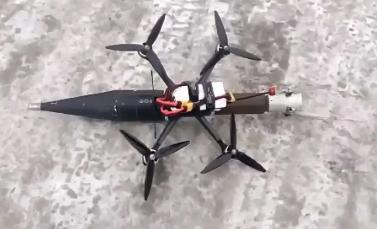
RPG 7 anti-tank launcher system on a “kamikaze-drone”
The Revenue Service informed us that from 2020 to 22 May 2024, all 649 applications received were approved. Among these, 67 permits were issued specifically for exports of network devices used for receiving, transmitting, and converting sound, images, or other data. Notably, in 2023-2024, after sanctions were imposed on the export of this dual-use product to Russia, the Revenue Service of Georgia issued 63 permits for the export or re-export thereof to other countries.
The export, import, or transit of dual-use items must be checked at the border. Vehicles are first inspected by a quick scanner and then by a customs officer at the checkpoint.
We asked exactly what information the border-installed scanners can detect, but the Revenue Service did not answer this question. Instead, we were told that providing such information could jeopardize customs procedures.
Meanwhile, we were informed in writing about the controls in general. The written response outlined that if the border guard suspects a violation of the law during the cargo’s transportation, he initiates a detailed inspection of documents, goods and/or vehicles, and physical persons. Furthermore, if a violation of the law is established, they draw up a violation protocol and send the materials away for investigation.
In the fall of 2023, we went to the Sadakhlo and Larsi checkpoints and observed the inspection of light vehicles. Here, we tell you what we saw with our own eyes.
Routinely, the customs officer would inspect the trunk, the front and rear seats, and all four doors of the vehicle. After this inspection, the driver would then be allowed to proceed to the point at which their documents are checked, with the corresponding process taking about 2-3 minutes. Sniffer dogs are also positioned at these checkpoints to examine the cargo further if necessary.
he Story of Elektromek-BT and Lazika Import - How Georgian Companies Assist Russia
A journalistic investigation conducted by Lithuanian media published in May 2024 stated that a Lithuanian transport company, Delamode Baltics, allegedly transported sanctioned cargo to Russia via Georgia.
Analyzing the Import Genius international trade database, we found out that the Georgian company Elektromek-BT Ltd. had assisted Delamode Baltics in transporting the cargo to Russia. The company was registered on 19 June 2021, while its director and owner is Mari Sarapyan, and its official core activity is classified as “construction.”
In July-October 2023, this company participated in the transportation of sanctioned dual-use goods to Russia 365 times. Sometimes it transported the cargo itself, while on other occasions they assisted others to do so. During this period, more than $24 million worth of sanctioned products were sent to Russia through Elektromek-BT, including ball and cylindrical roller bearings, electronic equipment, plugs, and sockets.
Sarapyan has also owned another transportation company called Lazika Import since December 2022. This company is also listed in the Import Genius database. According to the latter’s data, in 2023 sanctioned cargo worth $29 million was sent to Russia with the involvement of Lazika Imports.
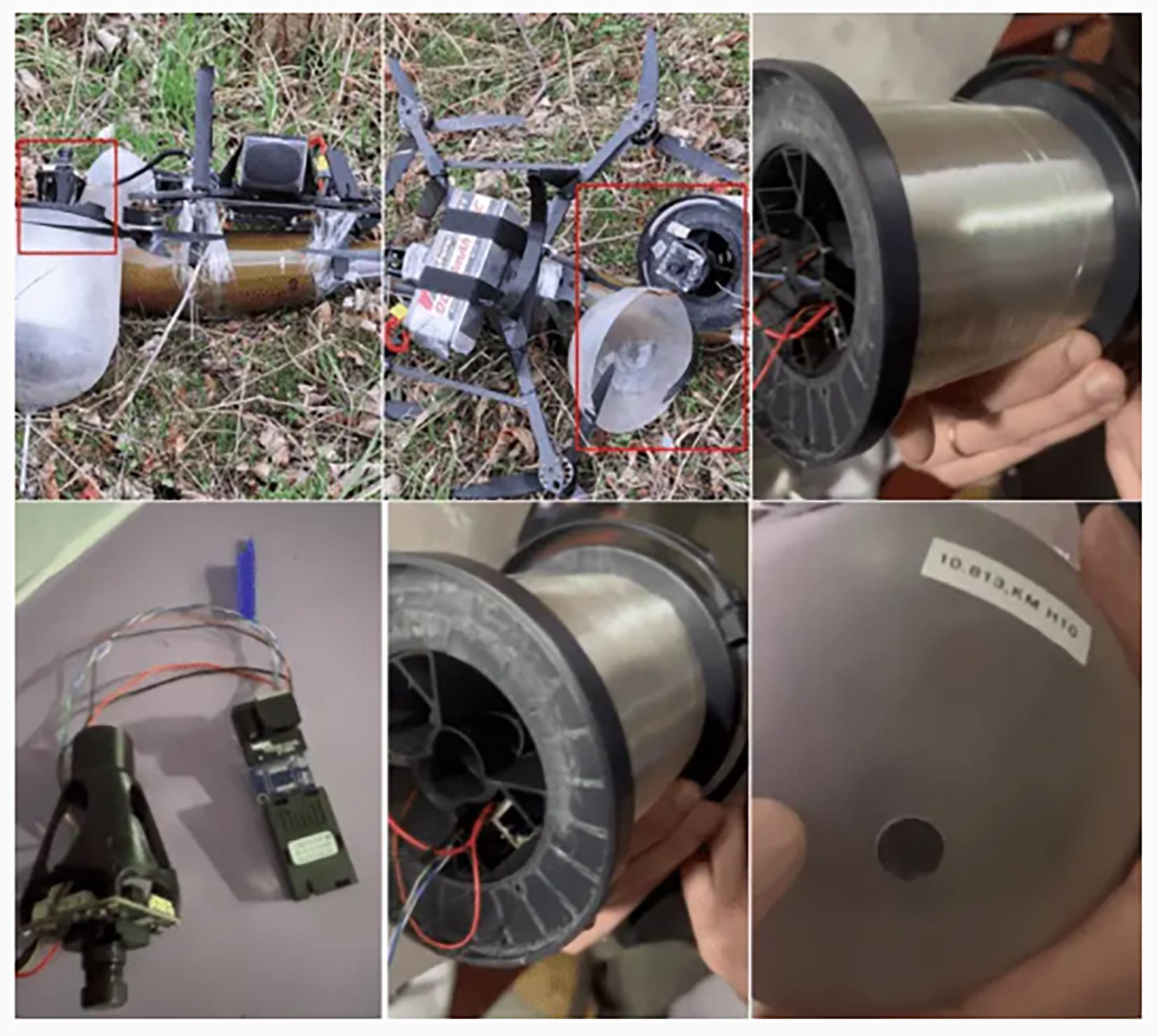
Communication systems installed on a Russian FPV drone, March 2024
Sources: Serhii Flash, mil.in.ua
Sarapyan confirmed that these two companies were indeed run by her. However, when she found out that we were journalists and wanted to interview her, she refused to talk. We still tried to ask her questions, reminding her that her companies had sent sanctioned cargo to Russia last year. She claimed that the companies had been out of business for a year, and hung up. We called again. This time she told us: “Don’t bother me, I’m a 62-year-old woman. I have heart problems and I am busy right now, call me in two days,” before she hung up again. When we called Sarapyan two days later, she told us: “I have neither the possibility nor the desire to talk to you.”
Sarapyan’s claim that the companies are no longer active is not true. Both companies are active in the register of taxpayers of the Revenue Service. Import Genius is an international database which collects official foreign trade data from Europe, Asia, and North and Latin America. In this database, we found two more Georgian companies involved in sending sanctioned cargo to Russia.
On 24 August 2023, LLC Face Plus sent sound/image receiving and transmitting equipment worth $40,000 to the Russian company Emmas in the Rostov region in collaboration with a Polish company. Face Plus is not listed in the public registry under that name though. We only know that Face Plus is located at 264 Omar Khizanishvili Street, Tbilisi, which is inside the Tbilisi Free Industrial Zone.
In January-February 2023, the Russian company Khort Trade in St. Petersburg received three shipments of dual-use cargo, including printed circuits, static converters, and plugs. These sanctioned products were sent to Russia by LLC Astery Group and the carrier was the Latvian company Ultra Trade Service.
Astery Group has been registered in Tbilisi since May 2022, and its director and owner is Vladimir Sapozhnikov, a Latvian citizen, who is also a board member of Ultra Trade Service.
Household Appliances Sent to Russia End Up in the War
Here, we set out to explain why refrigerators, washing machines, and dishwashers cannot be supplied to Russia. Naturally, you may be wondering what such appliances could possibly have to do with war. iFact spoke with military industry experts, current and former military personnel, former senior defense officials, and an international economic sanctions analyst.
All agreed that assembling combat weapons in modern warfare no longer requires extensive expertise. Weapon parts can be found in everyday items, some of which we carry on our person routinely, such as laptops or smartphones.
“Practically every Russian drone and military missile contains components that are also used in household appliances, like refrigerators. In simple terms, the metal you have at home could be given to someone in Russia who might use it to kill Ukrainians. It may sound like an exaggeration, but this is a true illustration of the scale of impact of these dual-use products,” said Giorgi Shaishmelashvili, an analyst with Civil Idea.
Since Russia’s full-scale invasion of Ukraine, the export of refrigerators, dishwashers, and washing machines from Georgia to the following countries has increased significantly: Russia, Azerbaijan, Armenia, Kazakhstan, Kyrgyzstan, and Uzbekistan. In 2023, washing machines worth $286,660 and dishwashers worth $41,390 were directly exported from Georgia to Russia.

Photo of a TV “brain” from Navtlugi spare parts market
Photo of a washing machine “brain” from Gldani household fair
“I now know for a fact that the drum motor of a washing machine can be used in unmanned military vehicles - ‘copters’ - to spin the rotor (rotating part). When you run out of military parts, you use what you have. There’s no other way, and that’s why military parts are so expensive that you can now buy five washing machines for the same price. It’s not a problem; you take what you need and throw the rest away,” explained Reserve Colonel Beridze.
Programmer and physicist Abashidze explained that if you are determined, it is relatively easy to disassemble household appliances and reassemble their parts into military weapons. According to him, this is due to the fact that, for example, a telephone, a washing machine, and a military drone all have the same chip.
Abashidze outlined: “I can take the ‘brain’ of any modern TV set and reprogram it into the ‘brain’ of a drone..... People think you have to be a rocket scientist to work with military technology, but times have changed. The Javelin missile system used to be a marvel, but now even my 14-year-old son can build one using this circuit (showing us the Arduino). It won’t be high quality and reliable, but when the war moves into the exhaustion phase, anything will do.”
Giorgi Kurulashvili, Director of Research and Development at the British IT manufacturing company Cott Electronics added: “The Russians, as it turned out recently (in the war on Ukraine), have used civilian semiconductors (chips) that are available for regular sale. This means that the semiconductor could be in a washing machine or a coffee machine.”
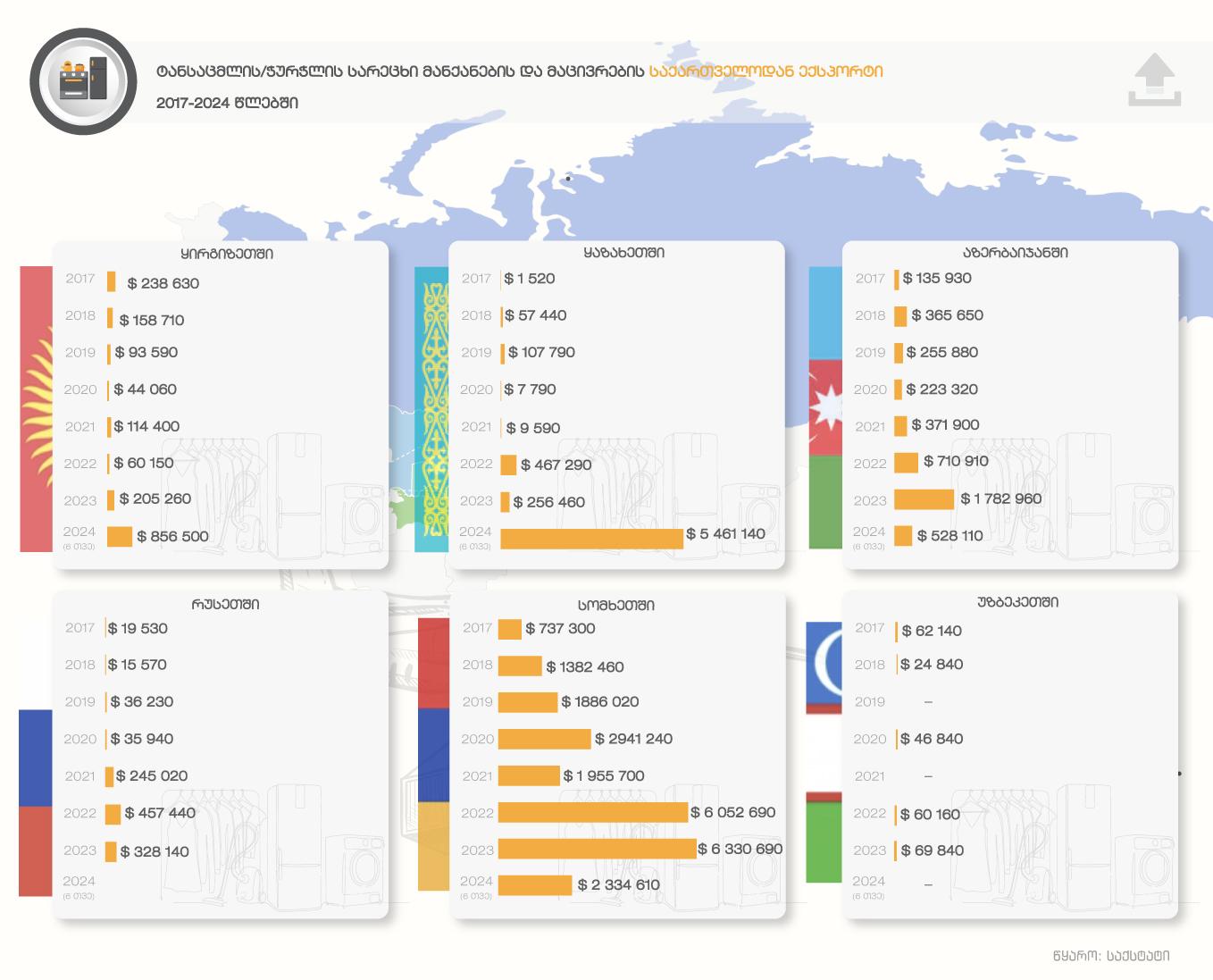
Exports of washing machines, dishwashers, and refrigerators from Georgia in 2017-2024
Source: Geostat
What is Tantalum and How is it Used on the Battlefield?
“Tantalum capacitors are essential to assembling electronics. By themselves, they aren’t much —they’re small — but even if you have chips and everything else, without tantalum, nothing works,” explained Abashidze.
Tantalum capacitors are an essential component of electronic devices that store the positive and negative charges of electric current, and the Russian military uses them to produce artillery shells.
Several months after Russia began its war on Ukraine, in November 2022, 710 kilograms of tantalum worth $2,400 was re-exported from Georgia to Armenia. This was an unprecedented case, as this product had seldom been exported from Georgia before other than in 2018, when tantalum worth $160 was exported to Bangladesh.

Tantalum capacitors, Photo: E-bay
In the Import Genius database, we found that this sanctioned product arrived in Russia from Georgia in October-December 2023. Tantalum capacitors worth $12,800 were shipped from China and entered Russia via the Georgian border. These transactions are not included in the foreign trade portal of Geostat.
Military analyst Koba Naroushvili told us: “Russia needs tantalum primarily for the production of shaped-charge projectiles. These projectiles can also be made from copper, but their effectiveness is four to five times lower—tantalum is optimal. We know the Russians are facing challenges with tantalum extraction and, logically, should have depleted their reserves by now.”
When asked if Armenia’s high demand for tantalum made sense, Naroushvili replied: “Armenia itself doesn’t produce high-tech, tantalum-based shells. They haven’t developed this technology. It’s easier for them to purchase ready-made shells.”
What is the Solution? — Lithuania’s Experience
n April 2024, the Lithuanian investigative media outlet LRT.lt published an article detailing how a Lithuanian company was transporting sanctioned dual-use goods to Russia. According to information gathered by LRT.lt, €130 million worth of dual-use products had been transported from Lithuania to Russia since the start of the war in Ukraine, with Kazakhstan, Kyrgyzstan, and Uzbekistan serving as transit countries.
Based on this journalistic investigation, Lithuanian law enforcement agencies launched an investigation in May 2024 and soon identified four suspects. The case is still under investigation.
We spoke with Ruta Jukneviciute, the author of the article, and asked her to provide more details about the measures taken by the Lithuanian government to fill the “black hole” they uncovered. According to her, after Russia’s war on Ukraine began, import-export controls in Lithuania became lax, and companies continued to supply Russia with sanctioned items through third countries such as Kazakhstan and Uzbekistan.
“…Lithuania has taken steps to tighten export restrictions; the government has imposed national sanctions on priority battlefield items. Additionally, land transit of such products through Lithuania has been banned, although this has not yet affected sea shipments,” Jukneviciute outlined.
If the Georgian government decides to strengthen control over the export of dual-use goods to Russia, it could, for example, draw from Lithuania’s experience and implement similar national-level sanctions.
Following the Lithuanian media’s investigative report, the Lithuanian government banned the export of dual-use items not only to Russia but also to non-EU countries.
Nino Evgenidze, Executive Director of the Economic Policy Research Center in Georgia, claimed that the currently uncontrolled situation will only be regulated when Georgia imposes independent internal restrictions in addition to international bans.
“If you detain the head of a transport company and ask him why he is transporting drones to Russia (via a third country), you can’t take any legal action against him because there is no law restricting this right. The state is facilitating this. What’s the problem? They should use those international databases listing prohibited products and issue a decree. This information severely damages our reputation and will lead to a loss of trust in us as a country,” said Evgenidze.
We also spoke with Maximilian Hess, a political risk and sanctions analyst at the British Foreign Policy Research Institute and author of Economic War, a book that examines Russia’s war on Ukraine and the sanctions imposed on Russia.
“If the government is truly committed to enforcing sanctions and wants to avoid becoming a violator, the best course of action would be to publish a separate list of high-priority battlefield items and impose additional export restrictions on them. In practice, this would mean requiring exporters to specify the final destination of their cargo. This measure is essential to prevent prohibited goods from reaching Russia via Georgia,” Hess suggested.
A week before publishing this article, we also reached out to the Revenue Service to arrange an interview. Its press office requested that we send our questions via email and assured us they would select an appropriate respondent. However, after two days, we received only a generic written response and consent for the interview has still not been granted.
They acted similarly in February 2024 when iFact exposed a scheme involving the supply of sanctioned cars to Russia and had critical questions for the Revenue Service to answer. At that time, their response was neither prompt nor adequate. After the article was published, the Revenue Service accused us of spreading disinformation against the country.
Contributors to the article: Ia Asatiani (interviewer); Nanuka Bregadze (interviewer); Manana Ghoghoberidze (Editor); Nino Gagua (Designer); Robi Zaridze (Videographer).
